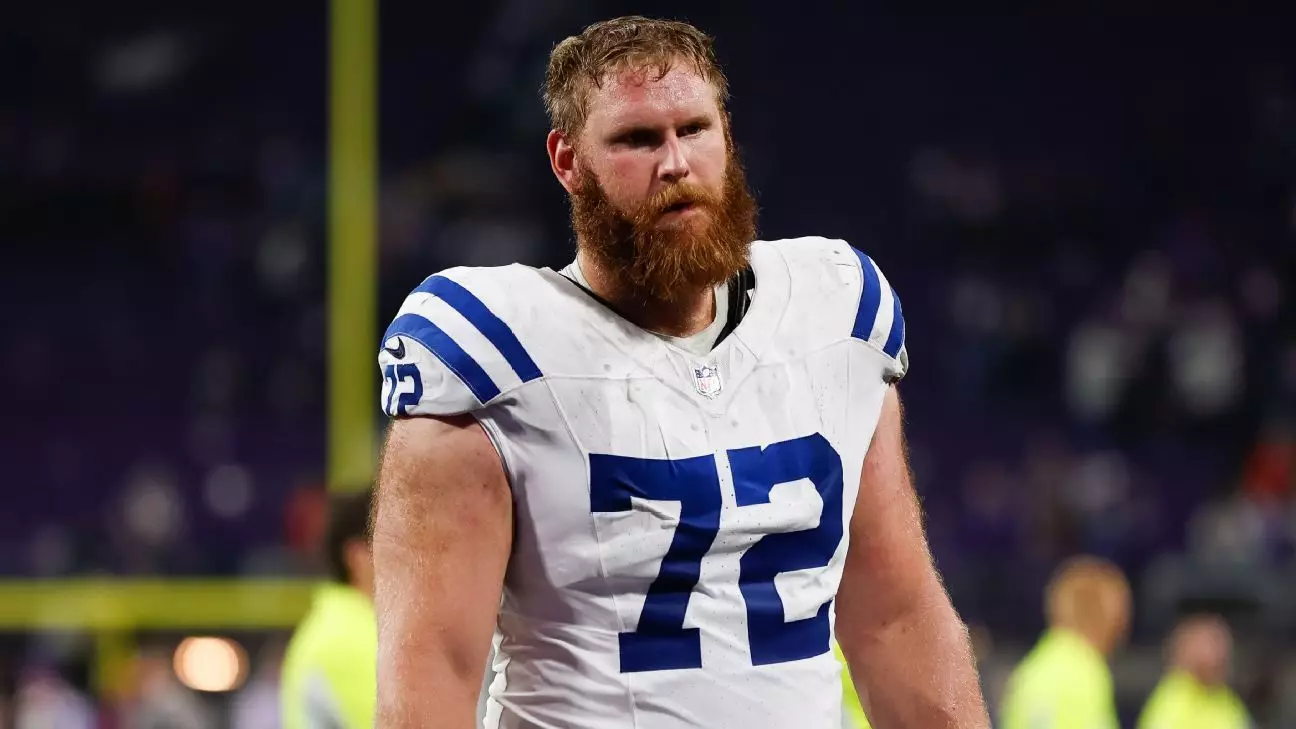In the high-pressure landscape of professional sports, the vulnerabilities athletes face often remain obscured by the bright lights of the stadium. Braden Smith, the veteran offensive tackle for the NFL’s Indianapolis Colts, is a testament to the silent struggles that many endure, yet few speak about. His recent revelations regarding his mental health journey underscore not just the importance of personal fortitude but also the need for greater awareness and support for mental illness in athletics. In a candid interview with the *Indianapolis Star*, Smith opened up about the harrowing depths of his battle with obsessive-compulsive disorder (OCD) and the profound impact it had on his life.
The Dark Abyss: A Battle with Religious Scrupulosity
Smith’s experience with his specific form of OCD, known as religious scrupulosity, illustrates a complex interplay between faith and mental health. Unlike typical religious devotion, scrupulosity manifests as an overwhelming anxiety that one might offend a deity or act blasphemously. The resultant compulsive behaviors can hijack an individual’s daily existence, causing significant distress. “I was so tormented that I contemplated suicide,” Smith confessed, revealing the stark reality of his internal struggle. Such honesty is not just refreshing; it is essential. It illuminates the invisible battle athletes face when their bodies, often seen as vehicles of triumph and strength, become prisoners to unrelenting thoughts and fears.
Having been diagnosed only after the season began, Smith’s route to addressing his mental health issues reflects a common theme in athletes: the difficulty of voicing vulnerability in a culture that prizes strength and stoicism. He candidly shared his considerations about retirement due to his unrelenting condition. His story underscores a critical lesson: mental health challenges can affect anyone, irrespective of their public persona as a successful athlete. At a point when most would be preparing for competition, Smith was grappling with existential despair.
The Turning Point: Seeking Help
Smith’s journey took a turn when he sought therapy, initially hoping to navigate his overwhelming feelings with professional guidance. However, his struggle persisted. The limits of traditional treatment revealed the need for innovative approaches. In a desperate bid for relief, Smith traveled to Mexico to explore treatment with ibogaine, a psychedelic substance currently not approved for use in the United States but showing potential in clinical studies for mental health issues. His experience is emblematic of a broader conversation in mental health circles: the exploration of alternative therapies as valid treatment options.
In today’s world, where conventional medicine sometimes appears inadequate, stories like Smith’s are vital. They provoke thought and encourage a re-evaluation of how society views mental health treatments. While the use of psychedelics in therapy remains controversial and necessitates further research, Smith’s success with it highlights an essential truth: people are craving solutions beyond traditional paradigms. He has become not just a survivor but an advocate for change in a field often overshadowed by stigma and misinformation.
The Road to Recovery and Renewal
Emerging from his battle, Smith remarked, “I wasn’t here last year. I want to be me again.” This statement resonates deeply with many who have faced similar battles. The path he has walked illustrates the power of resilience and the importance of infusing mental well-being into notorious environments like professional sports. Today, Smith speaks with renewed conviction about his life and career. No longer imprisoned by his past struggles, he has transformed those experiences into a source of strength. This rebirth reflects a commendable shift within the sport itself, as more athletes begin advocating for mental health.
Smith’s journey wasn’t just about his professional duties as a tackle; it was about reclaiming his identity. As he recognized, physical presence is not synonymous with true involvement. Emotional and mental engagement are crucial for a holistic existence, especially in high-stress professions. Today, the Colts organization stands by him, expressing confidence in his potential and acknowledging how extraordinary he can truly be on and off the field.
In many ways, Braden Smith’s narrative serves as a powerful reminder that each athlete is a human being first, fighting their own battles and deserving compassion and understanding. His willingness to confront his vulnerabilities publicly can inspire others to speak out, seek help, and embrace their journey of healing.


Leave a Reply